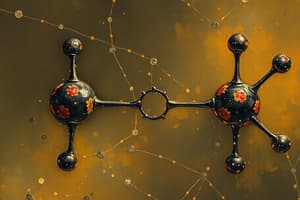Podcast
Questions and Answers
Determine the number of sigma (σ) and pi (π) bonds in tetracyanoethylene.
Determine the number of sigma (σ) and pi (π) bonds in tetracyanoethylene.
9σ and 9π
What is the shape of the 2p orbitals?
What is the shape of the 2p orbitals?
dumbbell
Which set of hybrid orbitals is represented by the picture?
Which set of hybrid orbitals is represented by the picture?
sp
Which atomic orbitals from carbon hybridize to form the bonds in CH₄?
Which atomic orbitals from carbon hybridize to form the bonds in CH₄?
How many unhybridized p orbitals does a hybrid orbital set have?
How many unhybridized p orbitals does a hybrid orbital set have?
Which molecule contains sp hybridized orbitals?
Which molecule contains sp hybridized orbitals?
Which hydrocarbon has all of its atoms in the same plane?
Which hydrocarbon has all of its atoms in the same plane?
What are the hybridization states for the two central atoms in CH₂NH?
What are the hybridization states for the two central atoms in CH₂NH?
Determine the hybridization of the central atom in phosphate (PO₄³⁻).
Determine the hybridization of the central atom in phosphate (PO₄³⁻).
The term 'delocalization' refers to:
The term 'delocalization' refers to:
Which of these molecules have delocalized electrons?
Which of these molecules have delocalized electrons?
What would be the bond order of the hypothetical molecule Ar₂?
What would be the bond order of the hypothetical molecule Ar₂?
What is the bond order of H₂⁺?
What is the bond order of H₂⁺?
Which statement is true about Fe²⁺ with the electron configuration [Ar]3d⁶?
Which statement is true about Fe²⁺ with the electron configuration [Ar]3d⁶?
How many unpaired electrons are found in a ground state atom of Os?
How many unpaired electrons are found in a ground state atom of Os?
How many unpaired electrons are found in a ground state atom of O?
How many unpaired electrons are found in a ground state atom of O?
According to molecular orbital theory, place the following molecules in order of increasing bond length: CN, CN⁺, and CN⁻.
According to molecular orbital theory, place the following molecules in order of increasing bond length: CN, CN⁺, and CN⁻.
Flashcards are hidden until you start studying
Study Notes
Bonds in Molecules
- Tetracyanoethylene has 9 sigma (σ) bonds and 9 pi (π) bonds.
- CH₄ involves hybridization of carbon's 2s, 2pₓ, 2p_y, and 2p_z orbitals.
- The bond order of hypothetical Ar₂ is 0, indicating no bond exists.
Orbital Shapes and Hybridization
- 2p orbitals are shaped like dumbbells, representing their spatial distribution.
- Hybrid orbital set represented in a visual context is identified as sp.
- Lewis structure of phosphate (PO₄³⁻) reveals the central atom’s hybridization as sp³.
- Two central atoms in CH₂NH exhibit hybridization states of sp².
Molecular Geometry
- The hydrocarbon C₂H₄ has all atoms in the same plane, indicating a planar geometry.
- Molecule C₃H₄ contains sp hybridized orbitals, contributing to its geometry.
Delocalization and Electron Configuration
- Delocalization describes electrons shared via π bonds among multiple atoms.
- The carbonate ion (CO₃²⁻) includes delocalized electrons.
- Electron configuration of Fe²⁺ is [Ar]3d⁶, confirming it is paramagnetic with four unpaired electrons.
Unpaired Electrons
- Ground state atom of osmium (Os) has 4 unpaired electrons, affecting its magnetic properties.
- Ground state of oxygen (O) contains 2 unpaired electrons, which is significant for its reactivity.
Bond Order Insights
- The bond order of H₂⁺ is calculated as 0.5, reflecting its weak bonding nature.
- Bond lengths vary among CN, CN⁺, and CN⁻ in the order of increasing length as CN⁻ < CN < CN⁺.
Review of Key Concepts
- Understanding hybridization, bond types, and electron configuration is crucial for predicting molecular geometry and reactivity in chemistry.
- Recognizing the implications of delocalization on stability and molecular shape provides insights into chemical behavior.
Studying That Suits You
Use AI to generate personalized quizzes and flashcards to suit your learning preferences.




